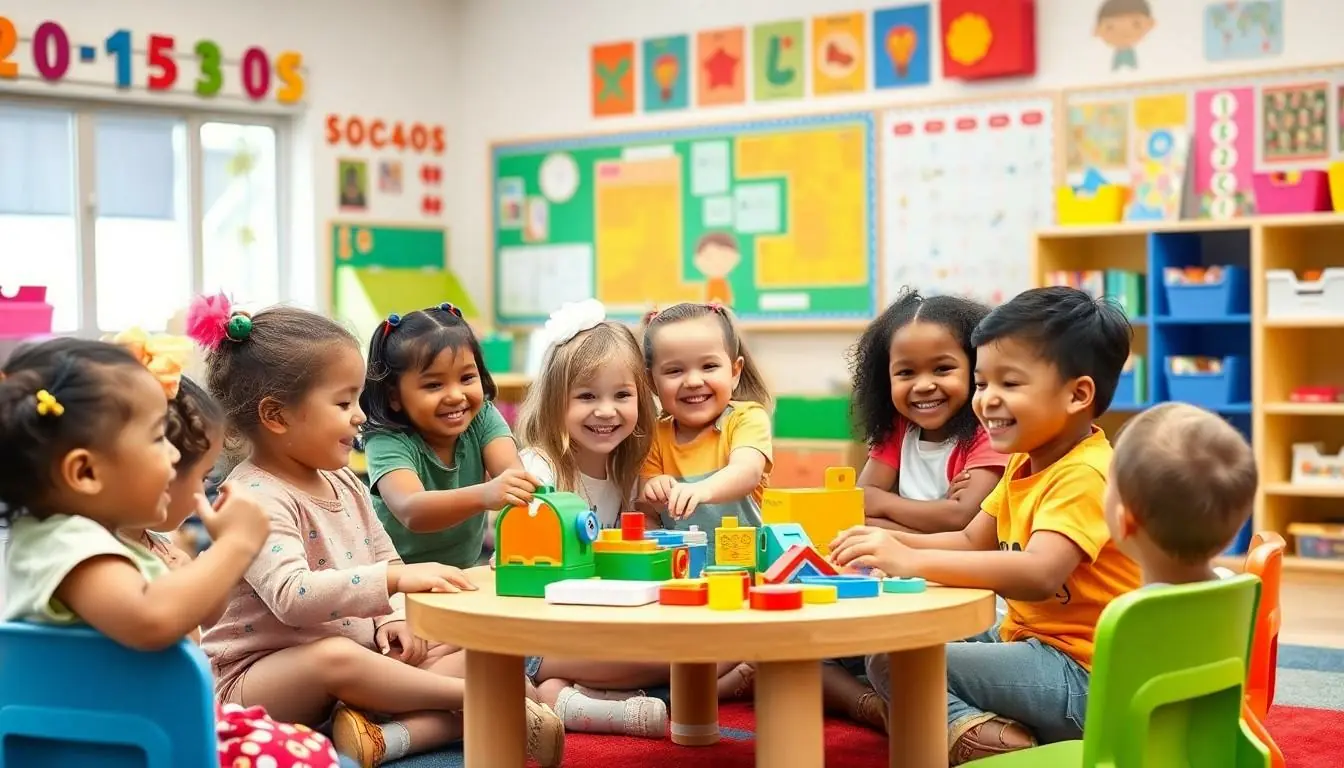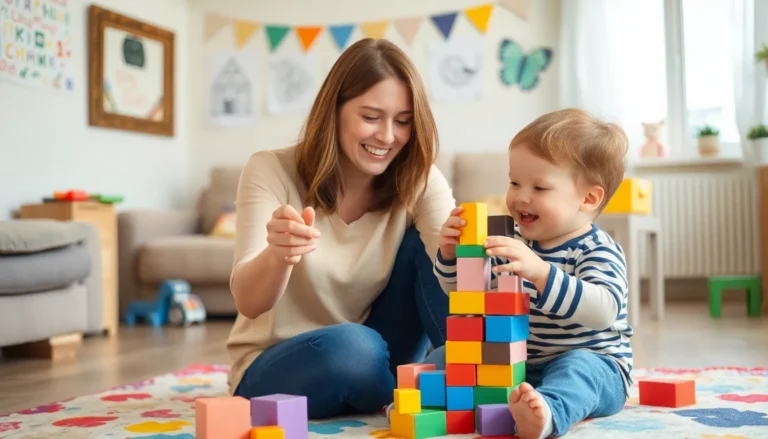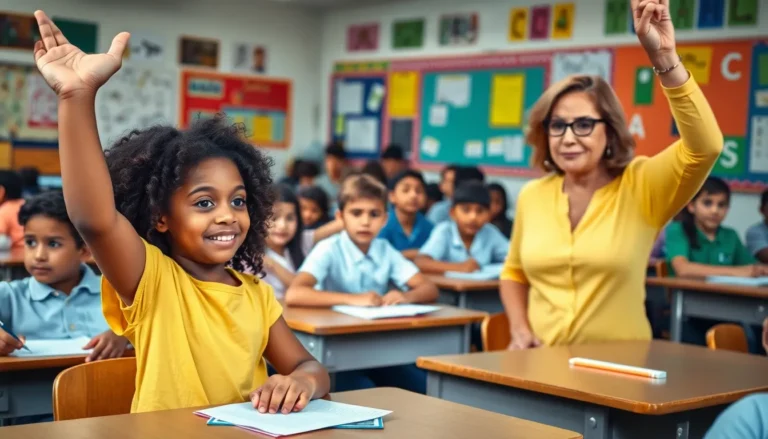Table of Contents
ToggleIn a world where kids can master the art of swiping before they can tie their shoes, teaching life skills in preschool has never been more crucial. Imagine a tiny human confidently pouring their own juice or negotiating the last cookie like a seasoned diplomat. Life skills preschool isn’t just about learning to share toys; it’s about preparing little ones for the big, messy adventure of life.
Understanding Life Skills Preschool
Life skills education in preschool equips children with essential abilities for their daily lives. Social skills form a critical foundation, laying the groundwork for communication and collaboration. Sharing toys or taking turns during playtime enhances their ability to interact effectively. Practical skills, like pouring juice or putting on shoes, foster independence and self-sufficiency.
Children learn to negotiate their needs through role-playing activities. These experiences build confidence in expressing thoughts and desires. Mixing structured activities with free play offers various opportunities to practice these essential skills. Accessibility to real-world scenarios prepares preschoolers for future challenges.
Emphasis on routine tasks enhances children’s sense of responsibility. When they help set the table or clean up after crafts, they gain ownership of their actions. Schools often implement small group activities, promoting teamwork and problem-solving skills. Such environments encourage children to work together towards common goals.
Parents play a pivotal role in reinforcing these skills at home. Engaging children in simple chores strengthens their understanding of collaborative efforts. Setting clear expectations helps children learn to navigate daily tasks without constant support. Overall, integrating life skills into preschool curriculums prepares children for the complexities of life ahead.
Importance of Life Skills in Early Childhood
Teaching life skills in preschool prepares children for various aspects of daily living. These skills help them develop in social and emotional areas, establishing a strong foundation for future growth.
Social Skills Development
Building social skills enhances a child’s ability to communicate and collaborate. Children practice sharing, taking turns, and expressing their feelings during group activities. This interactive environment teaches them to negotiate and resolve conflicts effectively. Engaging with peers in structured play fosters teamwork. Children learn to listen actively and appreciate different perspectives. Educational activities provide opportunities to strengthen relationships within diverse settings. As children engage in role-play, they gain confidence in initiating conversations and forming friendships.
Emotional Intelligence
Emotional intelligence plays a crucial role in a child’s development. Recognizing and managing feelings starts early in life. Activities designed to explore emotions help children articulate their thoughts and responses. By discussing scenarios, children learn empathy and understand others’ feelings. Preschool settings encourage self-regulation, fostering coping strategies during challenging situations. Techniques such as storytelling can promote resilience and emotional expression. Developing emotional intelligence influences children’s ability to form healthy relationships and navigate social situations.
Key Life Skills Taught in Preschool
Teaching essential life skills in preschool lays a solid foundation for children’s development. These skills prepare them for daily interactions and challenges.
Communication Skills
Effective communication forms the backbone of social interaction. Children learn to express thoughts, feelings, and needs clearly through various activities. They engage in conversations, practice active listening, and learn to share ideas with peers. Role-playing scenarios and group discussions enhance verbal skills, enabling them to articulate emotions. Non-verbal forms of communication also receive attention, as children discover the power of gestures and facial expressions. Games focusing on turn-taking foster respectful communication habits. Consequently, these interactions build strong relationships and develop empathy, essential for collaborating with others throughout life.
Problem-Solving Abilities
Developing problem-solving skills equips children to tackle challenges effectively. Through guided activities, they learn to identify issues and explore possible solutions. Teachers present real-life situations that encourage critical thinking. Group projects enhance teamwork and inspire creative solutions. As children brainstorm together, they practice considering diverse viewpoints. Navigating conflicts during playtime fosters negotiation skills and conflict resolution techniques. Encouragement supports autonomy as they experiment with strategies and adapt to outcomes. This hands-on approach instills confidence in their ability to solve problems, preparing them for future situations.
Personal Responsibility
Instilling a sense of personal responsibility starts early in preschool. Children learn the importance of completing tasks and understanding consequences. Daily routines, such as tidying play areas or caring for classroom materials, promote ownership. Encouraging them to participate in planning activities reinforces accountability. Regular feedback from teachers helps them recognize their achievements and areas for improvement. Additionally, children practice self-care routines, such as dressing and hygiene, which cultivates independence. By embracing responsibility, they develop discipline and become more reliable individuals, essential traits for future success.
Activities That Promote Life Skills
Engaging activities foster life skills in preschoolers. These activities enhance both social and practical abilities, helping children navigate daily challenges.
Interactive Learning Techniques
Interactive learning techniques engage children in hands-on experiences. Children participate in guided discussions, promoting critical thinking while exploring various topics. Employing tools such as flashcards, puppets, and storyboards encourages creativity and enhances retention. Group projects stimulate teamwork and cooperative problem-solving, allowing children to communicate effectively. Additionally, technology integration, like educational apps, can reinforce learning while making it enjoyable. Such techniques instill confidence and build curiosity, essential for lifelong learning.
Play-Based Learning Approaches
Play-based learning approaches focus on playful engagement to foster essential skills. Children discover life skills through imaginative play, role-playing, and games. These activities enable them to practice communication, negotiation, and decision-making in a safe environment. Facilitators can create scenarios that mimic real-life situations, encouraging children to problem-solve and cooperate with peers. Outdoor play offers opportunities for physical development along with social interactions. By allowing playful exploration, educators promote critical life skills while keeping learning enjoyable and relevant.
Conclusion
Teaching life skills in preschool is essential for fostering a child’s independence and emotional intelligence. By integrating practical abilities with social skills, educators prepare children to face everyday challenges confidently. Engaging activities and interactive learning techniques create a dynamic environment where children can explore communication and problem-solving in meaningful ways.
Parents play a crucial role in reinforcing these skills at home, helping their children develop a sense of responsibility and ownership. As preschoolers learn to navigate their emotions and collaborate with peers, they build a strong foundation for future relationships and success. Prioritizing life skills education ensures children are well-equipped to thrive in an increasingly complex world.








